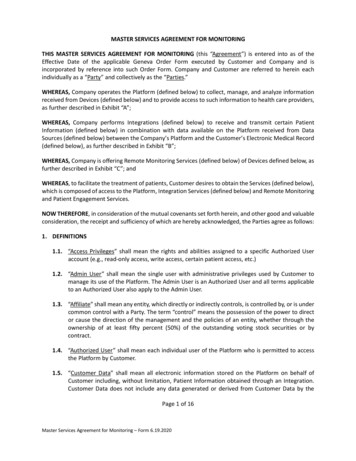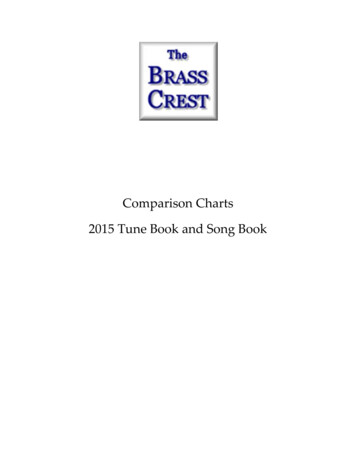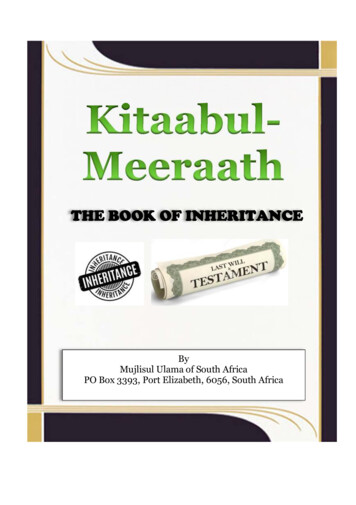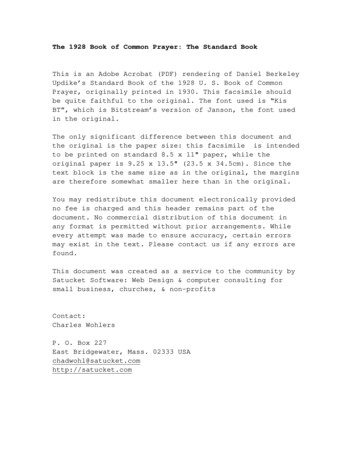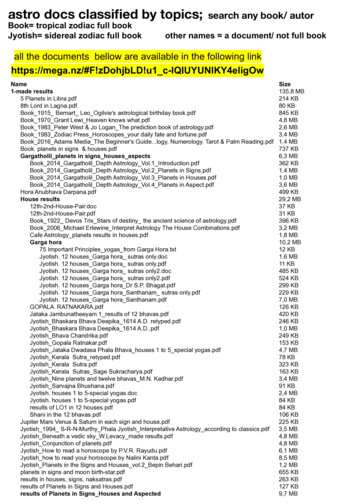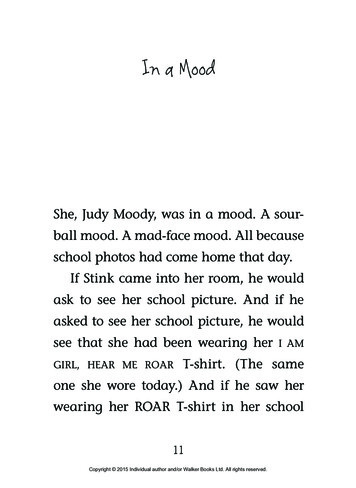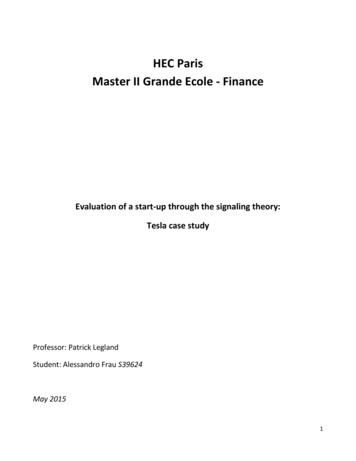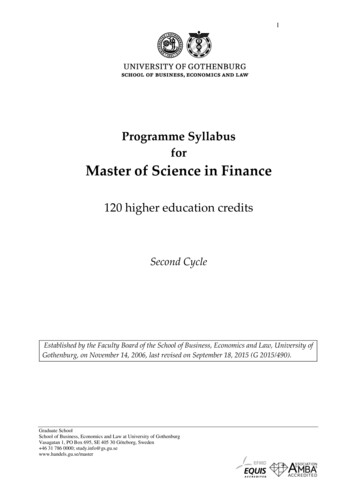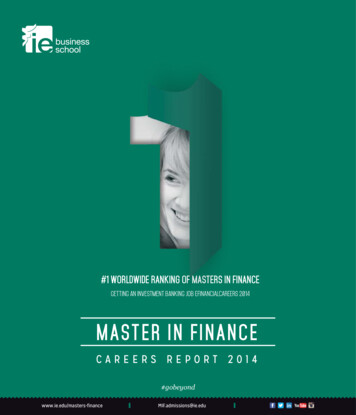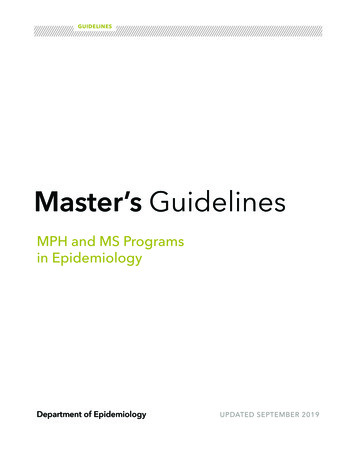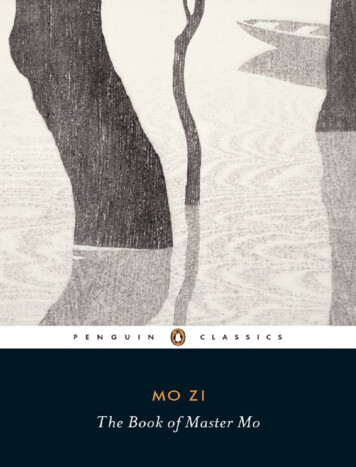
Transcription
T HE BO O K O F MA S T ER MOTranslated and edited with Notes by Ian Johnston
ContentsNote on the TranslationTable of Equivalences for Weights and MeasuresIntroductionTHE BOOK OF M ASTER M OChapter listI The EpitomesII Core DoctrinesIII Dialectical ChaptersIV The DialoguesV The Defence of a CityDatesNotesFurther ReadingGlossary
Follow Penguin
PENGUINCLASSICSTHE BOOK OF M ASTER M O(Mo Zi, Mo Di) lived through the last threequarters of the fifth century BCE and established a socialphilosophy which, if implemented, would, he thought,remedy the ills of the turbulent and chaotic times. This wasthe Warring States period, during which a number ofindependent states struggled in China either to maintaintheir independence or to gain control of other states. Aswas the common practice among itinerant philosophers ofthe time, he travelled from state to state, trying to find aruler who would implement his policies. But, unlike otherphilosophers, he had a second string to his bow – he wasalso an expert in defensive warfare. Although his school didnot survive the Qin unification (221 BCE), when Legalismbecame the dominant political philosophy, the book bearinghis name has fortunately survived as an important documentfrom the great flowering of Chinese philosophy.M ASTER M Ohas had a lifelong interest in ancientlanguages beginning in his days as a medical undergraduateat the University of St Andrews. Despite a busy medicalcareer he found time to pursue his studies of language,IAN JOHNSTON
obtaining a PhD in Chinese and an MA in Latin from theSydney University and a PhD in Greek from the Universityof New England, New South Wales. On his retirement asAssociate Professor of Neurosurgery at Sydney Universityin 1999, he moved to South Bruny Island off the southerncoast of Tasmania and now devotes his time to reading andtranslation. He has published two books of translations ofearly Chinese poetry (Singing of Scented Grass andWaiting for the Owl), which include some poems of hisown in response to his reading of early Chinese philosophy,and two translations of early Chinese philosophical works– the Mozi and the Daxue and Zhongyong (the latter incollaboration with Wang Ping) – both in bilingual form. HisGreek studies have focused on the remarkable secondcentury-CE doctor Galen, who exerted a profound and longlasting influence on both Western and Arabian medicine.He has published a translation of Galen’s four fundamentaltreatises on the nature of diseases and symptoms and thefirst complete English translation of one of his majorworks Method of Medicine, in a bilingual form for theLoeb Classical Library (in collaboration with GregHorsley). In 2011 he was awarded the New South WalesPremier’s Prize and the PEN medallion for translation.
Note on the TranslationThere have been very few translations of the Mozi intoWestern languages and most of these have been partial only.This neglect is due first to the extraordinary and sustainedlack of interest in Master Mo, his school and his book,which extended from the Han period to the mid-Qingperiod, and secondly, to the fact that although three of thefive parts (I, II and IV) are written in standard classicalChinese (wenyan) – a form of literary language thatremained remarkably constant over the years and is quiteaccessible to readers of Chinese today – the other twoparts (III, V) present a number of specific problems – asignificant scattering of unknown characters, lacunae,textual degradation, not to mention unfamiliar content andmethods of presentation. In view of these factors, I haveincluded a brief introduction before each of these sectionsand have an embedded commentary to clarify particularlydifficult passages.
Sections of the text were translated into English,German, Dutch and French in the nineteenth and earlytwentieth centuries, but it wasn’t until 1922 that AlfredForke published his almost complete translation intoGerman. Shortly after, Yipao Mei produced twocomplementary books on Master Mo in English: a generalstudy of the philosopher and his philosophy, and atranslation of the text that completely omitted Parts III andV.1 After a lapse of more than three decades, two importantpartial translations were published: by Burton Watson intoEnglish,2 and by Helwig Schmidt-Glintzer into German.3More recently, in a compendium of early Chinesephilosophy, Philip J. Ivanhoe has included complete orpartial English translations of eight of the Core Doctrineschapters.4 Important English translations of the difficultsections – Parts III and V – are those of A. C. Graham andR. D. S Yates, respectively. The present translation is basedparticularly on the modern Chinese edition of Wu Yujiang(Mozi Jiaozhu), first published in 1943 and reprinted intwo volumes in 1993. Among other modern editions, thoseof Li Yushu, Zhou Caizhu and Qi Ruiduan, and Li Shenglongwere particularly helpful. In addition, the earlier editions byBi Yuan, Sun Yirang and Zhang Chunyi were frequentlyconsulted, as were other works included in MZJC.
The translation of the Mozi (The Book of Master Mo)5which appears here is essentially that of the bilingualedition published by the Chinese University Press of HongKong in 2010. However, in providing this English-onlyedition for Penguin Classics, I have gone over the entiretranslation sentence by sentence and have made a numberof relatively minor changes. In this endeavour I havebenefited from the comments of several reviewers of thebilingual edition, in particular Carine Defoort, ChadHansen, Hui-Chieh Loy, Jeffrey Riegel, Karel van derLeeuw and Zhao Lu. I have continued to adhere to the ratheraustere and somewhat repetitive style of the original whichhas attracted strong criticism from some noted Westerntranslators. Watson, for example, wrote of Mo’s ‘pedestrianand uninspired’ language,6 while Graham commented on‘the notoriously graceless style of early Mohist writing,ponderous, humourless, repetitive’.7 But this imperfectionis limited to just Part II and is integral to the presentationof its arguments, as Han Fei originally pointed out.One other change I have made from the 2010 edition isto the two important ethical terms ren and yi, which I hadtranslated as ‘benevolence’ and ‘righteousness’,respectively, following long-established convention.Neither rendering really does justice to the scope of theseterms, a matter which I have discussed elsewhere. In the
present translation I use ‘love, kindness, humaneness andbenevolence’ for ren and ‘right action, righteousness andjustice’ for yi, with the transliterated Chinese term alsobeing given, and used alone after the first occurrence in achapter. I have retained ‘universal love’ as the translation ofthe key Mohist term jian ai in the face of modern attemptsto render this as ‘impartial caring’ or ‘impartial concern’.The problem with the former is that ‘impartial’ completelyfails to indicate the scope of the love. ‘Care’ and ‘concern’are unsatisfactory because they entirely fail to convey thestrength of feeling (made a point of in several places in theMozi), and ‘care’ doesn’t do justice to the force of ai,which is equated with ren in the Part III Canons. As MasterMo describes jian ai, it is an extension of the love one hasfor oneself or one’s parents to a universal loving kindnessdirected at all mankind without partiality or gradations.The hope is, of course, that this English-language editionwill make the work – one of critical importance for anunderstanding of early Chinese philosophy – available to awider range of readers. It is also pleasing to be able tocontinue the association between the Chinese UniversityPress and Penguin Classics. Of the five early Chinesephilosophical works already published by Penguin Classics,four have also been published as bilingual editions by theChinese University Press: The Analects of Confucius, The
Mencius and Lao Tzu: Tao Te Ching (all translated by D. C.Lau), and Daxue and Zhongyong8 or Ta Hsüeh and ChungYung – The Highest Order of Cultivation and On thePractice of the Mean (translated by Andrew Plaks).NOTESFor bibliographical details, see Further Reading and Selected Bibliography.1. M ei Yipao, Motse: The Neglected Rival of Confucius and The Ethical andPolitical Works of Motse.2. Burton Watson, Mo Tzu. The translation includes at least one example of each ofthe ten triads of the Core Doctrines chapters, together with the chapter‘Condemning Confucianism’. There are two chapters on ‘Exalting Worthiness’,‘M oderation in Use’ and ‘Heaven’s Intention’.3. Helwig Schmidt-Glintzer, Mo Ti – Schriften, 2 vols. (Dusseldorf/Köln, 1975).This includes most of the first two parts.4. Philip J. Ivanhoe, Mozi.5. The Book of Master Mo is referred to as Mozi in the Comments and Notes forthe sake of brevity.6. Watson, Mo Tzu, p. 15.7. Graham, Disputers of the Tao, p. 34.8. I. Johnston and Wang Ping, Daxue and Zhongyong – A Bilingual Edition (HongKong: Chinese University Press, 2012), pp. 530–37.
Table of Equivalences for Weights andMeasuresWEIGHTS1 liang 16g (16 liang 1 jin)1 jin 244g (30 jin 1 jun)1 jun 7.32kg (4 jun 1 dan)1 dan 29.32kgCAPACITIES1 sheng 199.687ml (10 sheng 1 dou)1 dou 1.996 litres (10 dou 1 dan)1 dan 19.968 litresDISTANCES1 cun 23.1mm (10 fen 1 cun)1 chi 23.1cm (10 cun 1 chi)1 bu 1.38m (6 chi 1 bu)1 zhang 2.31m (10 chi 1 zhang)
1 li 0.576km (variable) (1 li 300 paces)Taken from Yates (T), which is based on M. Loewe,Records of Han Administration (Cambridge: CambridgeUniversity Press, 1967), vol. 1, p. 161, with the addition ofliang and li. The latter is taken from the Dictionnaire Ricciwhere the distance, although given precisely, is noted asvariable.
List of ChaptersPart I The Epitomes1 Being Sympathetic to Officers2 Cultivating the Self3 Dyeing4 Standards and Rules5 The Seven M isfortunes6 Eschewing Faults7 Three ArgumentsPart II Core Doctrines8 Exalting Worthiness I9 Exalting Worthiness II10 Exalting Worthiness III11 Exalting Unity I12 Exalting Unity II
13 Exalting Unity III14 Universal Love I15 Universal Love II16 Universal Love III17 Condemning Offensive Warfare I18 Condemning Offensive Warfare II19 Condemning Offensive Warfare III20 M oderation in Use I21 M oderation in Use II22–24 (Lost)25 M oderation in Funerals III26 Heaven’s Intention I27 Heaven’s Intention II28 Heaven’s Intention III29–30 (Lost)31 Percipient Ghosts III32 Condemning M usic I33–34 (Lost)35 Against Fate I
36 Against Fate II37 Against Fate III38 (Lost)39 Against the Confucians IIPart III Dialectical ChaptersIntroductory Note40 and 42 Canons and Explanations A41 and 43 Canons and Explanations B44 The Greater Choosing45 The Lesser ChoosingPart IV The Dialogues46 Geng Zhu47 Valuing Yi48 Gongmeng49 Lu’s Questions50 Gongshu51 (Lost)Part V The Defence of a CityIntroductory Note
52 Preparing the Wall and Gates53 Preparing Against the High and Adjacent54–55 (Lost)56 Preparing Against Ladders57 (Lost)58 Preparing Against Water (Flooding)59–60 (Lost)61 Preparing Against Sudden Attack62 Preparing Against Tunnelling63 Preparing Against the ‘Ant Approach’ (M assed Infantry Assault)64–67 Lost68 Sacrifices for M eeting Enemies69 Flags and Pennons70 Orders and Commands71 M iscellaneous Defences
IntroductionThere is very little biographical information on the earlyChinese philosopher, Master Mo (Mo Zi, Mo Di), or onmembers of his school (the Mohists), which flourishedduring the Warring States period (475–221 BCE)immediately preceding the Qin hegemony. There is alsovery little known about the extant work which bears hisname (the Mozi) – in particular, who wrote it or when it waswritten or compiled. What is clear is that Master Mo andhis school were major participants in the great flowering ofChinese philosophy from the sixth through the thirdcenturies BCE. Mohism provided the first and most directopposition to Confucianism as presented in the Analects.1In doing this the Mozi represents the first use in Chinesephilosophy of systematic argumentation employing criteriaof validation to support its theses. It contains the earliestspeculations on the natural sciences and several keyaspects of philosophy – for example, epistemology, logicand philology. It contains a detailed exposition of the
methods of defensive warfare, so important in suchturbulent times. Above all, it contains the reasonedpresentation of the ten ‘core’ doctrines which compriseMaster Mo’s social and political philosophy. Tosummarize, these ten doctrines may be reduced to fivegroups:1. The fundamental doctrine of love for all people without partialitytowards individuals or groups; this love becomes manifest in theexchange of mutual benefit.2. Establishment of a multilevel, hierarchical administrative structure, withselection based on moral worth and general ability, and on a uniformityof core beliefs extending down from the Emperor, the Son of Heaven, toordinary men and women.3. Recognition of a system of supramundane surveillance involving Heaven,ghosts and spirits capable of observing human activities and respondingby rewarding goodness and punishing evil.4. A policy of restraint and moderation in the use of materials and wealth.5. Rejection of the idea of fate as instrumental in the lives of people.Master Mo’s overriding justification for his system wasthat it made for a better functioning and happier society,especially compared to the chaos that prevailed at the time,but also generally and eternally – that is, it worked toeveryone’s advantage.Despite the undoubted merits of the Mohist doctrinesand the importance of the school at the time of itsflourishing, Mohism largely died out with the progressive
entrenchment of Confucianism as the ‘state’ philosophyduring the Han Dynasty (206 BCE–221 CE). The book itself(Mozi) was largely neglected during the ensuing centuriesuntil it was rediscovered by scholars of the evidentialresearch school in the Qing Dynasty (1644–1911) – menwho w
MASTER MO (Mo Zi, Mo Di) lived through the last three- . chapter. I have retained ‘universal love’ as the translation of the key Mohist term jian ai in the face of modern attempts to render this as ‘impartial caring’ or ‘impartial concern’. The problem with the former is that ‘impartial’ completely fails to indicate the scope of the love. ‘Care’ and ‘concern’ are .
